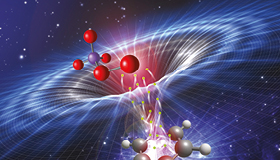This is a lecture delivered by Professor Michel Che of the Université Pierre et Marie Curie-Paris 6 & Institut Universitaire de France, the 2014 winner of the RSC's Faraday Lectureship Prize (http://www.rsc.org/ScienceAndTechnology/Awards/FaradayLectureshipPrize/).
Professor Che was awarded the Faraday Lectureship Prize for pioneering a molecular approach to catalyst design by bridging the gap between homogeneous and heterogeneous catalysis through the new field of interfacial coordination chemistry
The lecture will take place between 3 and 4pm on Friday 23rd January 2015.
Title: Relevance of geochemistry to the life of a catalyst: when fire meets water
Abstract: 85-90% of all chemical processes are catalytic and 80-85% of the latter use solid catalysts. The importance of supported catalysts that contribute for 75% of solid catalysts comes from the variety of reactions they are able to promote [1a,1b]. In the industry, their preparation involves a series of unit operations [1a], such as deposition of a precursor of the active phase on the oxide support from an aqueous solution, elimination of the solvent, drying, calcination, sulfidation and reduction. In unit operations, both the liquid-solid and gas-solid interfaces are involved. Compared to the latter, the liquid-solid interface has been rather neglected [2] despite the fact that different methods of deposition (incipient wetness impregnation, equilibrium adsorption or deposition-precipitation) affect the final properties of the catalyst. This is a clear indication that the phenomena initially occurring at the solid-liquid interface do contribute to the final properties of the catalyst.
In order to investigate catalysts preparation, we have developed a molecular approach based on transition metal complexes and stable isotopes [3] as well as suitable spectroscopies [4] to investigate the liquid-solid interface. We have shown that catalysts preparation is related to several fields of chemistry and in particular colloid science, electrochemistry, supramolecular chemistry, coordination chemistry and geochemistry, giving thus a conceptual framework to the science of catalysts preparation.
While earlier studies have largely discussed the relevance of coordination chemistry to the science of catalysts preparation as well as the role of the oxide support as solid ligand, the present lecture will focus on geochemistry and the role of the oxide support as reactant. The major contribution of geochemistry has been to improve our understanding of the so-called ageing with subsequent formation of mixed species or phases on oxide supports, under conditions where the latter can dissolve. It will be shown that water and heating are the key parameters and are at stakes during all the steps of the catalyst life (preparation, reaction and regeneration).
References:
[1] a) Handbook of heterogeneous catalysis, 2nd Ed., G. Ertl, H. Knözinger, F. Schüth, J. Weitkamp Eds, Wiley-VCH, Weinheim, 2008, 8 volumes; b) J.M. Thomas, W.J. Thomas, Principles and practice of heterogeneous catalysis, 2nd Ed., Wiley-VCH, Weinheim, 2014.
[2] F. Zaera, Chem. Rev. 112 (2012) 2920.
[3] M. Che, Stud. Surf. Sci. Catal. 75A (1993) 31 and 130A (2000) 115.
[4] Characterization of solid materials and heterogeneous catalysts: From structure to surface reactivity, M. Che and J.C. Védrine Eds, Wiley-VCH, Weinheim, 2012, 2 volumes.
Professor Che was awarded the Faraday Lectureship Prize for pioneering a molecular approach to catalyst design by bridging the gap between homogeneous and heterogeneous catalysis through the new field of interfacial coordination chemistry
The lecture will take place between 3 and 4pm on Friday 23rd January 2015.
Title: Relevance of geochemistry to the life of a catalyst: when fire meets water
Abstract: 85-90% of all chemical processes are catalytic and 80-85% of the latter use solid catalysts. The importance of supported catalysts that contribute for 75% of solid catalysts comes from the variety of reactions they are able to promote [1a,1b]. In the industry, their preparation involves a series of unit operations [1a], such as deposition of a precursor of the active phase on the oxide support from an aqueous solution, elimination of the solvent, drying, calcination, sulfidation and reduction. In unit operations, both the liquid-solid and gas-solid interfaces are involved. Compared to the latter, the liquid-solid interface has been rather neglected [2] despite the fact that different methods of deposition (incipient wetness impregnation, equilibrium adsorption or deposition-precipitation) affect the final properties of the catalyst. This is a clear indication that the phenomena initially occurring at the solid-liquid interface do contribute to the final properties of the catalyst.
In order to investigate catalysts preparation, we have developed a molecular approach based on transition metal complexes and stable isotopes [3] as well as suitable spectroscopies [4] to investigate the liquid-solid interface. We have shown that catalysts preparation is related to several fields of chemistry and in particular colloid science, electrochemistry, supramolecular chemistry, coordination chemistry and geochemistry, giving thus a conceptual framework to the science of catalysts preparation.
While earlier studies have largely discussed the relevance of coordination chemistry to the science of catalysts preparation as well as the role of the oxide support as solid ligand, the present lecture will focus on geochemistry and the role of the oxide support as reactant. The major contribution of geochemistry has been to improve our understanding of the so-called ageing with subsequent formation of mixed species or phases on oxide supports, under conditions where the latter can dissolve. It will be shown that water and heating are the key parameters and are at stakes during all the steps of the catalyst life (preparation, reaction and regeneration).
References:
[1] a) Handbook of heterogeneous catalysis, 2nd Ed., G. Ertl, H. Knözinger, F. Schüth, J. Weitkamp Eds, Wiley-VCH, Weinheim, 2008, 8 volumes; b) J.M. Thomas, W.J. Thomas, Principles and practice of heterogeneous catalysis, 2nd Ed., Wiley-VCH, Weinheim, 2014.
[2] F. Zaera, Chem. Rev. 112 (2012) 2920.
[3] M. Che, Stud. Surf. Sci. Catal. 75A (1993) 31 and 130A (2000) 115.
[4] Characterization of solid materials and heterogeneous catalysts: From structure to surface reactivity, M. Che and J.C. Védrine Eds, Wiley-VCH, Weinheim, 2012, 2 volumes.








